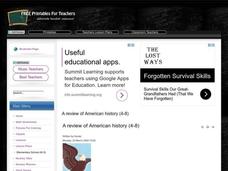K20 LEARN
The Spiro Mounds Builders: Oklahoma History
Long before European settlers arrived on the shores of what is now the United States, pre-contact Native American cultures thrived. Young scholars investigate the Spiro Mounds Builders' history and learn how archaeologists put together...
Curated OER
Voice of History
Way before the digital age radio was the medium of popular culture. After listening to excerpts from radio programs (easily available on the Internet), participants return to the radio age by creating a two-minute sketch based on a...
New York State Education Department
US History and Government Examination: June 2017
Ready for a test that uses primary sources as a tool to assess comprehension? Learners answer multiple choice, essay, and short answer questions to demonstrate their understanding of American history.
National Woman's History Museum
Create your own Women’s History Museum
Celebrate Women's History with a museum display. Divide the class into seven groups and assign each a different historical topic/time period. Each group member researches a different woman of that time period and creates an exhibit that...
New York State Education Department
US History and Government Examination: June 2011
Those who lived during the Great Depression could clearly draw a line between the roaring 1920s and the desolation of the following decade. Class members examine these two periods and compare them using an essay question prompt and...
Angel Island Immigration Station Foundation
Exploring Oral Histories of Angel Island Immigrants
Empowered by the previous lesson where they interviewed a family or community member, young historians examine Angel Island immigrants' oral histories. They use a matrix to record their interpretation of the feelings of the immigrant....
Curated OER
State Your Business
Second graders conduct research on a selected state in the United States. They read a book and write down interesting facts, conduct Internet research, and create a brochure using Microsoft Office Publisher.
Curated OER
The Colonization of the United States
Bring the Age of Exploration into the 21st century with this ancestry activity! Learners get a chance to explore the complex genealogy of the Spanish settlers through watching two video clips (approximately five minutes each) featuring...
Curated OER
Unit 2: Post-Revolution: The Critical Period 1781-1878
The post-Revolutionary Period of 1781-1787, also known as the Critical Period, is the focus of a series of lessons that prompt class members to examine primary source documents that reveal the instability of the period of the Articles of...
Echoes & Reflections
The "Final Solution"
Nazi policies shifted from deportation and imprisonment to extermination of the Jewish people in death camps in the "Final Solution." Learners examine photos of artifacts, read poetry written by survivors, analyze testimony from...
Curated OER
Native Americans in Arkansas: The Quapaw
The Quapaw Indians of Arkansas are the focus of this American history lesson. Learners discover many aspects of the Quapaw culture, such as their dwellings, social organization, food, and how the tribe was eventually driven out of...
Curated OER
Regents Review Worksheet #1: Principles of the U.S. Constitution
Kids who take the Regents Exam really need to know a lot of information. This is a wonderful exam review tool that includes 26 pages of questions, charts, and suggested readings to help upper graders pass the test. It focuses on all...
PBS
Women's History: Parading Through History
Want to teach your pupils about debate, effective speech techniques, propaganda, and the women's movement? The first in a sequential series of three, scholars analyze real propaganda images from the the historic women's movement, view a...
Curated OER
Trey and Dave go to Africa: Music
Trey from Phish and Dave from the Dave Mathews Band took a trip to Africa to explore music, culture, and history. Your class watches this episode from VH1's Music Studio to understand how African culture and music have influenced modern...
Anti-Defamation League
Impact of the U.S. Expansion on Indigenous People and Stereotypes About Native American People
The 2004 U.S. bicentennial sparks a discussion about its meaning and importance to United States history. Readings, maps, tables, and reflective writing prompt small groups to explore the westward expansion, Lewis and Clark, and how...
Curated OER
A Review of American History
In this lesson students research an important event in American history and use drama, art, music, and dance to express their findings. Suggested activities include illustrating a time line, decorating a shoe box, reciting a speech,...
Curated OER
U.S. History
In this U.S. history instructional activity, 5th graders complete multiple choice questions about important events in U.S. history. Students complete 5 multiple choice questions.
Curated OER
Kentucky Challenge
In this state facts learning exercise, students read the phrases about the state of Kentucky and select the best answer to complete the 10 statements.
Smithsonian Institution
Mexican War
Did you know that without the Mexican War, the United States would not include the states of Arizona, California, New Mexico, Texas, Nevada, Utah, and even parts of Colorado? Scholars learn a variety of interesting facts about the...
West Virginia Department of Education
Declarations and the Quest for Life, Liberty and the Pursuit of Happiness
Understanding how John Brown got his inspiration from the Declaration of Independence helps learners further understand both West Virginia and United States history. The resource, a standalone, uses worksheets, discussion, and essay...
PBS
Evolution of the Presidency: Theodore Roosevelt to Franklin D. Roosevelt
How much power should a president be allowed to exert? Theodore Roosevelt and Franklin D. Roosevelt exercised their power according to their interpretations of the United States Constitution, and these interpretations affected the...
Alabama Department of Archives and History
Alabama's Secession in 1861: Embraced with Joy and Great Confidence. Why?
From December 20, 1860 to June 8, 1861, eleven states seceded from the Union. Alabama seceded on January 11, 1861. Why did so many white Alabamians want to secede? Why did they believe the South could win the war? These are the essential...
Curated OER
The Federalist Papers (1787-1789)
An online interactive history quiz awaits your eager upper graders. They respond to 50 multiple choice questions about the Federalist Papers, and then submit their answers to be scored. While the quiz covers some pertinent information,...
Common Core Sheets
Placing Events on a Timeline
Put important events in chronological order with a lesson about timelines. With a variety of topics stemming from world history, the packet of worksheets provides analytical activity for learners to decide where certain events fall...

























